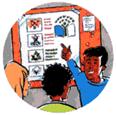|
|
Nature Trust (Malta) launched EkoSkola in a seminar which was organised at Mount St Joseph Retreat House on 22nd January 2004. The event was attended by head teachers and teachers from 65 different primary and secondary schools. St. Joseph Primary - Blata l-Bajda had accepted to be part of the EkoSkola pilot project during the 2003-2004 scholastic year. The Senior School joined the programme in March 2004. |
About Eco-SchoolsEco-Schools is an international award programme that guides schools on their journey towards learning about sustainable development issues and sustainable practices, providing a framework to help embed these principles into the heart of school life. Eco-Schools is one of five environmental education programmes run internationally by the Foundation for Environmental Education (FEE). In addition to Eco-Schools, FEE runs Green Key, Young Reporters for the Environment, Blue Flag and Learning about Forests. There are 46 countries around the world that run the Eco-Schools programme, linking more than 40,000 schools - from the UK to France, from Morocco to South Africa. Eco-Schools is administered in Malta by Nature Trust, while Dr Paul Pace is the National Co-ordinator. |
|
How it worksThe Eco-Schools programme involves seven steps that any school can adopt. Based on the elements of an environmental management programme, the process involves a wide range of stakeholders but it is pupils who must play the most important role. Although Eco-Schools may be awarded a Green Flag after a period, the process is on-going and schools must continue to work towards their objectives and re-apply for the award in the future. |
|
 |
Establishment of the Eco-School Committee: The core of the Eco-Schools process, the Committee organizes and directs the school activities and consists of the stakeholders of the school environment, namely pupils, teachers, custodial staff, caretakers, parents and even representatives of the municipality or local authority. The sense of democracy involved, and the motivation in resolving initiatives brought forth by the students themselves are products of this process. |
 |
Environmental Review: Work commences with a review or assessment of the environmental impact of the school. Pupils are involved in this work, ranging from assessing the level of litter on school grounds to checking infrastructure for inefficiencies. |
 |
|
 |
|
 |
Curriculum Work: Classroom study of themes such as energy, water and waste are undertaken by most students. The whole school should be involved in practical initiatives, for example, saving water, recycling materials and preventing litter. Where environment and sustainable education is not part of the national/regional curriculum, recommendations are made as to how this can be incorporated. Efforts should be made to involve environmental education throughout the curriculum, in addition to the more evident areas of study such as science and geography. |
 |
Informing and Involving: This directly brings Local Agenda 21 into schools, as parents, local authorities, businesses and the wider community are involved in the Eco-Schools process. Schools are encouraged to make ties with external organisations in order to benefit from their experience and expertise. Eco-Schools are also encouraged to consider the wider community when preparing action plans. Schools can keep the wider community informed of actions taken through classroom displays, school assemblies and press coverage |
 |
Eco-code: Each school produces its own 'Eco-code', a statement of values and objectives, outlining what the students are striving to achieve. |
|
Source: FEE website: http://www.eco-schools.org/aboutus/howitworks.htm
|
|
|
St Joseph School, Blata l-Bajda was among the first schools on the island to be awarded |
|
